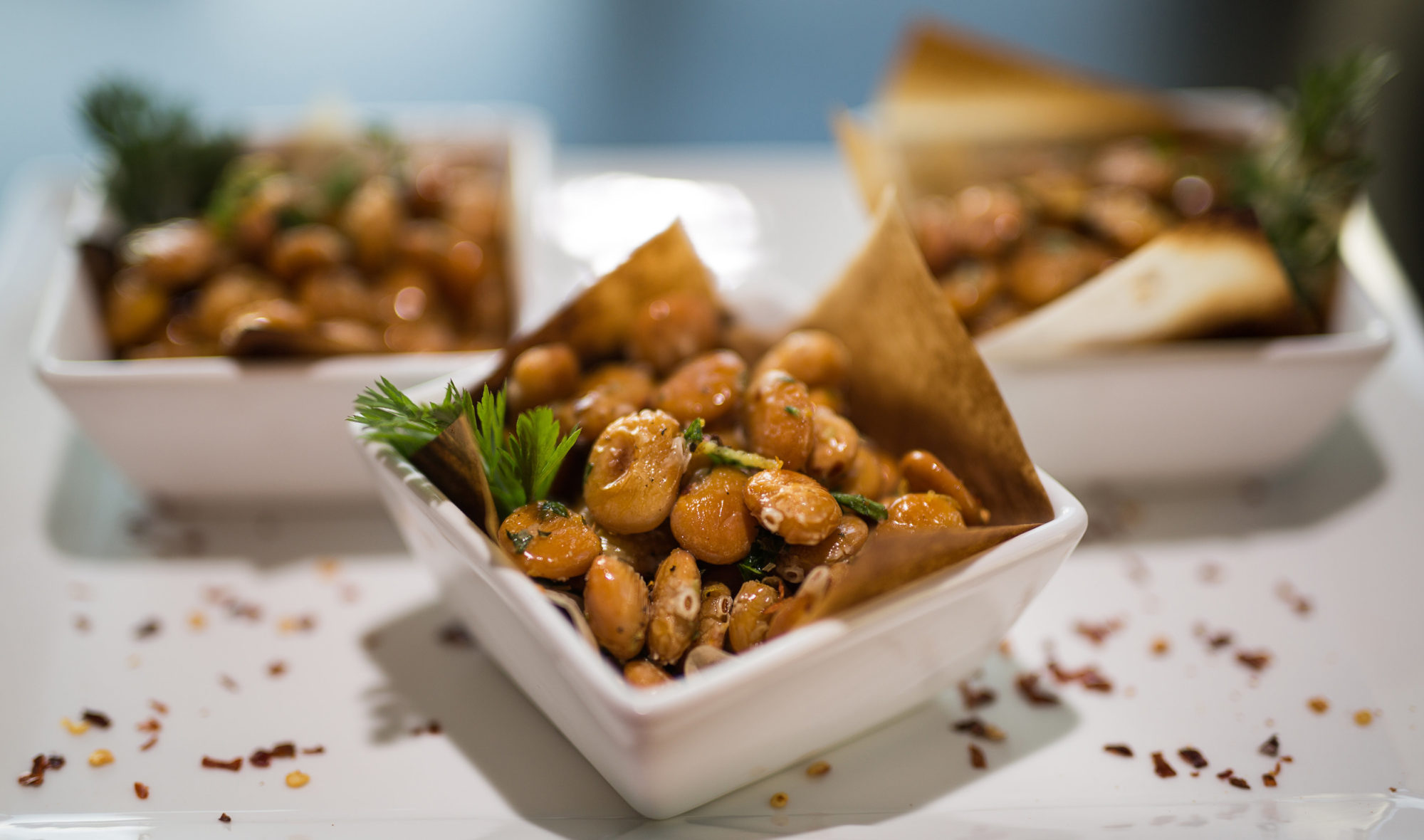
Join PN Level 2 for less than $9 USD/day! Affordable monthly payments now open.

Lupini beans are the seeds of the lupinus plant. Though toxic and unpalatable in their natural state, these legumes can be quite tasty after a lengthy soaking period. Lupini beans are also highly nutritious, offering a generous amount of protein, fiber, and vitamins. To avoid the one to two week soaking period, look for canned lupini beans in a well-stocked supermarket.
Lupini beans, also called lupins, are the seeds of the lupinus plant.
These legumes contain a high alkaloid content, making them very bitter and even toxic to eat without the proper preparation. However, if cooked correctly, they can be both nutritious and tasty.
A traditional food of the Mediterranean, lupini beans are sometimes eaten pickled as a snack. In Italy, they are considered a treat at Christmas.
Lupini beans look somewhat similar to lima beans — they are of similar size, have a flat, oval shape, and are yellowish in color.
The legume has a hard outer skin or husk, which is edible and contains the more palatable, softer bean inside.
One 1 cup (166g) of lupini beans, cooked and boiled without salt, contains approximately 198 calories, 26 grams of protein, 16 grams of carbohydrates, 5 grams of fat, and 5 grams of fiber.
Lupini beans contain generous amounts of manganese, copper, magnesium, phosphorus, potassium, and zinc. They also offer folate and vitamin A.
Note that while lupini beans naturally contain only a small amount of sodium, the prepared canned variety can be quite heavy on the salt. One popular brand contains 960mg of sodium per ½ cup serving (that’s 41.7% of the 2300mg upper limit intake recommended by the CDC).
Look for lupini beans with other canned beans / legumes in a well-stocked supermarket.
You may also spot them in Portuguese or Italian markets, where you may find them pickled, in a jar or vacuum sealed bag, and ready to eat.
As noted, it’s best to be aware of the sodium content when buying canned lupini beans. Because lupini beans may be soaked in a salt-water solution to rid them of bitterness, they do retain quite a bit of sodium. When selecting canned lupini beans, check the sodium content on the can first.
Note: you may be able to find ‘sweet’ lupini beans – a variety that is less alkalide and requires less soaking to become palatable.
As usual with canned beans, use before the expiry date. If using dried beans, store them in a cool, dark place. Make sure they are properly marked so they do not get confused with another type of bean, since lupini beans are toxic if not cooked correctly.
Once a can is opened or lupini beans are soaked and prepared, they will keep in the fridge for up to 5 days.
If using canned lupini beans, thoroughly rinse the beans before eating. (While this is a good tip for all canned beans, it is especially important with lupini beans, given their high salt content. You won’t be able to rinse away all the salt but you may be able to reduce it by close to half the amount.)
If using dried beans, you will need to pre-soak them. Recipes for soaking vary: some suggest soaking in water for two weeks, others propose a salt-water solution for one to two weeks, and still others recommend boiling the beans before the soaking process.
The simplest method is to soak the beans in cold water, changing the water daily, for at least a week. Over time, the alkaloids will dissolve into the water and the beans will become softer and less bitter. How long you soak the beans will depend on your personal preference: the longer they soak, the less bitter and firm they will be.
Once finished soaking, you can eat the beans raw, but they will be quite firm. Most people prefer to cook the beans. One tasty method is to slow cook them with garlic and olive oil. You may also try marinating them in spices, herbs and olive oil, or pickling them.
The prepared beans can be added to salads or enjoyed on their own as a side dish or snack.
You can eat the beans with the skin on, but if you prefer a softer texture, tear the tough skin lightly with your teeth, and pop the inner bean into your mouth.

These cookies are tasty and make for a great snack or dessert. The lupini beans add a punch of protein and contribute nicely to the overall flavor and texture of the cookies.
Prep Time: 15 minutes Cook Time: 25 minutes Yield: 16 large cookies
Open the can of lupini beans and pour them into a strainer. Rinse them very well. Transfer the beans to your food processor or high power blender.
Cut the pears into quarters and core them. Put the quarters into your food processor or high power blender (no need to remove the skin).
Add remaining ingredients, with the exception of the flour, to your food processor or high power blender. Blend until smooth. Add the flour to the food processor and blend again until well combined.
Line three cookie sheets with parchment paper (or tin foil lightly greased with coconut oil). Drop cookie batter by the spoonful onto the cookie sheets. Bake in 350°F oven for 20 – 25 minutes or until cookies are firm and top is golden brown.
Store leftovers in fridge.
Enjoy!
Precision Nutrition’s Encyclopedia of Food expands every single month as we highlight new foods and showcase beautiful food photography. If you’d like to stay up to date, simply click this link. From there, we’ll send you a FREE copy of our recipe book. We’ll also let you know when new and delicious foods are added to the site.
Lupini beans are the seeds of the lupinus plant. Though toxic and unpalatable in their natural state, these legumes can be quite tasty after a lengthy soaking period. Lupini beans are also highly nutritious, offering a generous amount of protein, fiber, and vitamins. To avoid the one to two week soaking period, look for canned lupini beans in a well-stocked supermarket.